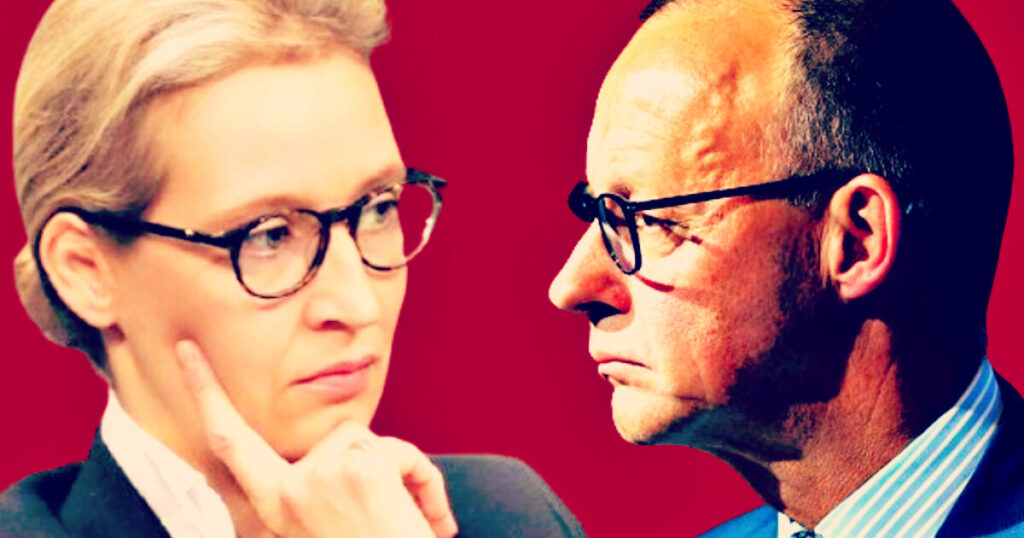Recent developments in German politics have created ripples not only within the nation but also across Europe. A striking new opinion poll indicates that Alice Weidel of the Alternative for Germany (AfD) party has surged ahead of Friedrich Merz, leader of the Christian Democratic Union (CDU), in the race for the chancellorship. This emerging trend is surprising, especially given that just months ago, many analysts viewed Merz as the next in line for leadership. The newfound popularity of Weidel can be partly attributed to her recent endorsement by tech mogul Elon Musk, who has often been seen as a ‘kingmaker’ in political circles. This support may be fueling the AfD’s rising status within the context of a broader shift across Europe toward nationalist and populist movements.
The recent poll results shed light on Weidel’s burgeoning influence. Conducted by INSA for BILD with 1,005 participants, the survey reveals that Weidel has garnered 24% support, marking a three-point increase and allowing her to outpace Merz, who holds 20%. This is notable because it is the first time Weidel has led in the polls. The timing is critical, as the data was collected shortly before a terrorist attack at a Christmas market in Magdeburg, which could potentially amplify support for the AfD’s anti-migration policies. This incident underlines the party’s positioned narrative around security and immigration, which resonates with a significant portion of the electorate.
Additionally, the demographics of Weidel’s support are noteworthy. Among younger voters aged 18 to 29, her support is particularly strong at 23%, compared to just 12% for Merz. This generational divide signals a potential shift in political loyalties that may redefine the landscape of German politics in the coming years. The implications of this pose a serious challenge for the CDU, which has historically dominated the centre-right landscape. Although Merz’s backing has faltered, the poll results show that Chancellor Olaf Scholz, along with other key political figures such as Economics Minister Robert Habeck from the Green Party, are also struggling in public trust, with Scholz at a mere 15% approval rating.
Elon Musk’s influence on Weidel’s campaign is not merely symbolic but may translate into tangible electoral advantage. His recent comments referring to Scholz as “an incompetent fool” and his overt support of the AfD could galvanize right-wing support in a country historically cautious about far-right movements. Musk’s reach and media presence provide a significant platform for Weidel and the AfD to promote their agenda, positioning them as viable alternatives in the eyes of the public. Moreover, the harmonious exchange between Weidel and Musk, where she warmly reciprocated his message of support, suggests a budding alliance that may appeal to a broader nationalist base.
The evolving political landscape raises important questions about party dynamics in Germany. As the CDU grapples with declining popularity, there’s an emerging perception of the AfD as a stronger representation of voter sentiment, especially regarding immigration and national identity. This potential shift appears not just tied to localized events but also reflects a larger European trend where populist parties capitalize on public discontent with traditional political establishments. Merz’s challenge lies not only in recovering lost ground but also in recalibrating CDU’s messaging to attract both traditional conservatives and a younger electorate that exhibits a growing inclination toward right-wing populism.
In summary, the current state of German politics indicates a significant tilt towards Alice Weidel and her AfD party. With new polling data positioning her as a frontrunner for chancellorship, bolstered by high-profile support from influential figures like Elon Musk, the AfD is cleverly leveraging contemporary socio-political issues to enhance its appeal. As the CDU confronts its slipping popularity, the dynamics of voter loyalty, especially among younger demographics, suggest a possible seismic shift in political allegiance. The challenges ahead for traditional parties will require innovative strategies to engage with an electorate that is increasingly drawn to the rhetoric of nationalism and populism.

